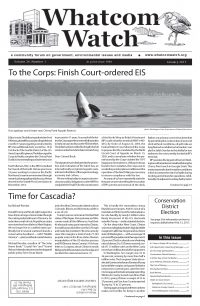by Jemae Pope and Aaron Ostrom
To celebrate 25 years of publishing Whatcom Watch, we are printing excerpts from 20 years ago. The article below is from the January 1997 issue of Whatcom Watch.
Washington residents drove over 50 billion miles in 1995. It doesn’t take a rocket scientist to figure out that this probably wasn’t so great for the environment. Every time you watch exhaust on a cold morning, or look at the smog, you know something unhealthy is happening. Nevertheless, surprisingly few environmentalists consider transportation a top-priority environmental issue. In unexpected ways, excessive driving harms Washington’s beautiful lands which are very near and dear to our hearts (and health). It’s worth taking a closer look at the full environmental impacts of driving.
Cars Kill Trees
Motor vehicles account for over 50 percent of Washington state’s air pollution. This pollution weakens trees and other plants, reducing their growth and causing premature death. One German study found that each car, over its lifetime, was responsible for three dead trees and 30 “sick” trees.
Cars Kill Salmon
Highway culverts block migration on salmon-bearing streams. More importantly, widespread paving reduces ground water levels and causes run-off problems, essentially producing a drought/flood pattern that destabilizes stream beds and scours fish habitats. Studies in the Seattle area have shown that fish habitat quality and salmon and amphibian populations decline if as little as 10-15 percent of an area is covered with impervious surfaces. Forty to fifty percent of the surface area in most cities is covered with impervious surfaces dedicated to cars (streets, parking lots, garages, etc.).
Cars Kill People
Traffic accidents kill around 40,000 people in the United States alone each year and severely injure 500,000 more. This is comparable to a medium-sized war every year. In the Northwest, traffic accidents killed 2,000 people in 1993, more than guns or illegal drugs. Air pollution also has a major impact on human health.
Cars Kill Shellfish and Other Water Creatures
The oil, rubber, metals, and other toxic pollutants from automobiles that contaminate storm water run-off are a major source of the water pollution plaguing Puget Sound and other bodies of water. For example, as much oil gets into Lake Michigan every year from street runoff as from the Exxon Valdez oil spill. The relentless onslaught of oil spills — millions of gallon per year in countless accidents both gigantic and small — is a painful illustration of the impacts of extracting, distributing, and refining the oil that feeds our auto-dependence.
Cars Kill Wetlands and Open Space
Road and highway construction destroys wetlands. The alarming conversion of Washington’s rural and natural areas to urban sprawl is based on auto-oriented development patterns.
Cars Kill Communities
One study found that people have over twice as many friends on their street when it has fairly light traffic (2,000 vehicles per day), than on a similar street with busy traffic (16,000 vehicles per day). Auto-oriented developments (e.g. malls and discount warehouses) displace neighborhood businesses and take away from the character and appearance of our towns and communities. Tax dollars spent on roads consume resources that could be used for schools, parks, and other community developments.
Cars Threaten the Stability of Life on Earth
Automobiles are Washington state’s largest source of carbon dioxide emissions. (Carbon dioxide is the main cause of the greenhouse effect.) The average car produces 20 pounds of carbon dioxide per gallon of gasoline used. Finally, it is discouraging, but important to note that the actual majority of a car’s contribution to pollution occurs before it is driven anywhere, during the resource gathering and manufacturing phases of motor vehicle production.
Our point is not that all driving is terrible. In many American communities, it is often the only reasonable option for many trips. Our point is that when driving is the only viable option for most people, the impacts are intolerable. We need a balanced transportation system that offers affordable choices — real opportunities to ride the bus, take a train, walk, bicycle, and carpool as well as to drive alone.
Environmentalists need to make transportation alternatives a priority, both in their personal choices and in their efforts to change public policies. ALT-TRANS (the Washington Coalition for Transportation Alternatives) is a coalition of concerned individuals, public interest groups (including Washington Environmental Council), businesses, and public agencies working to educate the public and promote policies that support alternatives to driving alone. Add your voice to the call for a more balanced transportation system.
Please call, write, or e-mail us at 915 E. Pines Street, Suite 301, Seattle, WA 98122, Telephone: 206/325-9932, Fax: 06/325-9936, E-mail:plschiller@transact.org.
_________________________________________
Jemae Pope is ALT-TRANS communications director. Aaron Ostrom is ALT-TRANS policy director and also serves on the board of the Washington Environmental council.




























